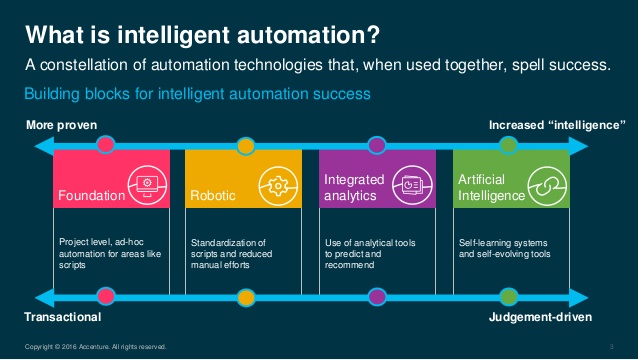Digital transformation has become a go-to strategy for enterprises in every domain. Boardroom meetings are now more focused on adopting digital technologies to find business solutions. A digital framework helps an enterprise in lowering manual inefficiencies by leveraging Artificial Intelligence (AI). While implementing new business processes, your enterprise also needs to know where to start with. One of the best changes that an enterprise can make is harnessing a smart solution that maximizes the potential of its skilled workforce. This is where Intelligent Automation comes into action.
What is Intelligent Automation?
Intelligence Automation (IA) is a seamless integration of process automation and Artificial Intelligence technologies. It improves the capabilities of enterprise machines and devices beyond data processing, helping them carry out smarter actions without any manual help. IA solutions help business firms overcome the challenges of their traditional work functions. A recent Harvard Business Review highlights the impact of enterprise-wide Intelligent Automation on boosting revenues by 9% by driving workforce capacity and reducing operational costs.
With the help of Intelligent Automation, organizations can gain unparalleled efficiency and empower their operations with fast-paced end-to-end automated processes. Intelligent Automation is no longer limited to the manufacturing sector as it gains applications in the retail and FMCG environment, along with healthcare, finance, and telecommunication.
Why Build an IA Framework for Your Enterprise
Intelligent Automation is dynamic in providing solutions to an enterprise. It offers multiple applications and use-cases for every organization. The main framework of an IA solution is supported by four pillars, namely:
- Robotic Process Automation
- Business Process Management
- Integration Platforms
- Artificial Intelligence

Robotic process automation (RPA) is the crux of every IA solution. RPA tools are running customer services around the world, providing instant responses to queries in real-time. Invoice processing is a global use-case of robotic process automation, helping enterprises around the world. In 2020, RPA-based solutions played a key role in driving businesses remotely during the COVID-19 lockdowns.
At a corporate level, IA plays a distinguished role in enabling a successful digital transformation. It implements Business Process Management (BPM), where a set of principles and best practices are automated across corporate processes. BPM solutions help your enterprise coordinate and connect with users, systems, and tasks.
RPA reduces human intervention in monotonous tasks, while BPM improves business agility. To compile these solutions into organizational success, you need integrated platforms. These platforms synchronize your IA systems together and tackle common yet critical issues such as redundancy and data duplicity.
Lastly, AI gets into the mix of all this and mimics our cognitive learning to deliver intelligent insights. It generates human-like reasoning capabilities to automated solutions, making them more flexible and adaptive. Simply put, an AI automated intelligence is perhaps the most powerful tool for an enterprise.
The Business Value of Automated Intelligence
To leap ahead, enterprises need to replace their traditional workflows by bringing in some smart automation. There is no need for a heavy dependency on manual labour when you have RPA and AI tech at your disposal. IA solutions can prevent your company from hitting low productivity levels. They can prepare your business for future emergencies. When your business automation becomes intelligent, it can deliver high-quality customer experiences with its intuitive interactions.
McKinsey, a global management consultant, observes that enterprises across industries are automating up to 70 percent of their tasks to register nearly 35% cost efficiencies and triple-digit RoIs. Smart automation is also easing your employees by helping them stay focused on important tasks. The time consumed on menial tasks gets lowered considerably under IA-based operations.
Moreover, your business procures a superior degree of scalability. You can implement flexible marginal costs by enabling IA capabilities with integrated data systems and AI-based process management tools. As and when your organization collects unstructured data, IA-based data solutions can pull out and decipher valuable business information accurately. Identifying patterns and inconsistencies becomes more feasible, even from large datasets.
Intelligent automation improves the business value of your enterprise by running bots and predictive analytics that fine-tune processes based on your prescriptive. Smart automation deployment also addresses the needs of every individual in an enterprise. It improves contact resolution rates and elevates cybersecurity protocols throughout your organization.
Adopting Intelligent Automation
IA is no longer an abstract concept and every other company in the world is familiarizing it with RPA and AI-driven automation. While the implementations and their advantages may vary from enterprise to enterprise, you still need to adopt Intelligent Automation nonetheless. Today’s customers are tech-savvy, who need accurate yet instant outputs. Satisfying these needs is possible when your enterprise is automated with tools and systems as intelligent as you, or perhaps even more.
For lowering operational risks and increasing production capacity, Kilowott’s AI services offer top-notch Intelligent Automation for your enterprise. With Kilowott, you can automate your success at business with smart digital transformation.




